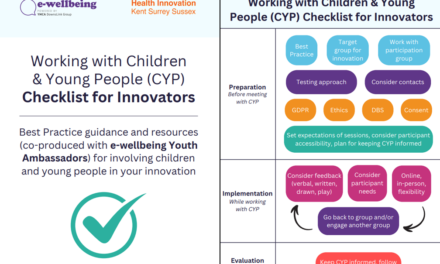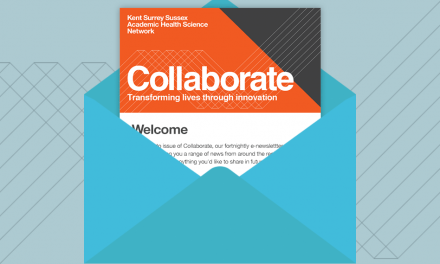To mark the new year we’ve created a series of blogs looking at what 2020 has in store for various elements of the region’s health and social care economy.
This week Jo Congleton, Clinical Lead, KSS AHSN Respiratory Programme and Consultant in Integrated Care SCFT/BSUH, looks at what 2020 has in store for those working in respiratory.
The beginning of a New Year is always a time to reflect. 2020 marks a new decade and, like Janus, I find myself looking both behind (considering past achievements) and forwards (excited about the future and what more there is to achieve).
The KSS AHSN Respiratory programme evolved from the 2010 National COPD and Asthma Outcomes Strategy. The previous 10 years have seen our Respiratory Network grow in both numbers and strength. We are now connected to over 1,000 members who play varied roles in respiratory care, the aim is to improve outcomes, reduce variation and spread innovation and good practice. We run two vibrant respiratory collaborative events a year, have two productive clinical networks, and our e-publication ‘Breathing Matters’, has recently released its 45th edition.
Success stories
The outcomes strategy was shelved when government changed but the respiratory programme, under the wing of KSS AHSN, has delivered on several topics:
I would consider our COPD (Chronic obstructive pulmonary disease) Discharge Bundle Programme a success. Each year in our region over 40,000 bed days result from admissions due to an exacerbation of COPD. Year on year across KSS we have seen an increased proportion of patients admitted to our acute trusts receive based best care; five evidence based interventions pre-discharge.
This has been associated with a reduction in variation, and an improvement in outcomes, such as reduced length of stay and reduced in-hospital mortality. We are now seeing a reduction in re-admission rates.
National spread and adoption
Looking forward the COPD Discharge programme has been taken on by the National Patient Safety Collaborative in its adoption and spread programme, with KSS AHSN leading and providing national support. We still have work to do in the region, our focus looking forward is to improve our case ascertainment rate i.e. the proportion of all COPD admissions counted.
Key to this programme has been our COPD dashboard, developed by our Insights team. This allows providers to monitor their outcomes, compare themselves with other teams and show returns on investment. Tom Myers, senior analyst, has subsequently developed a national COPD dashboard which is proving key to the national programme of work.
Clinical networks
The Oxygen Clinical Network has been working to support services to provide cost-effective home oxygen to patients. The network has agreed region-wide protocols on such things as; capillary blood gas sampling, long term oxygen assessment and ambulatory oxygen assessment.
Looking forward the remit of the network is to broaden and will encompass ‘respiratory failure’. One task is to update the six Non Invasive Ventilation (NIV) modules hosted on the Education for Health platform that a group of our members produced previously. This will re-focus attention on acute NIV pathways where we feel there is opportunity to improve on pathways and patient outcomes.
Our second clinical network is our Pulmonary Rehabilitation Network. Pulmonary Rehabilitation (PR) is an evidence based, cost effective, intervention for patients with chronic respiratory conditions, where an individualised twice weekly exercise work out is core.
Patients who complete the six week programme benefit from reduced breathless, increased exercise capacity and improved quality of life. Just ask a patient who has completed a programme to hear the benefits first hand!
Our PR network has been providing education and peer support to all PR providers in the region. The PR national audit data show that KSS programmes are above national average in several key metrics.
New year, new goals
2020 brings in the national PR service accreditation process, which aims to assure quality of individual PR programmes. Our PR networks is providing a structure for our PR providers to go through the accreditation process on a regional basis with support from ourselves and the National Team. This regional approach is a pilot for the National PR programme, and on a personal level this collaborative approach makes me proud of our clinicians.
The NHS Long Term Plan (LTP) was published in the previous decade and we are now in delivery phase. Care of Respiratory conditions is embedded in the LTP; the focus on early and accurate diagnosis links to our work on quality assured spirometry. The goal of increased access to PR links to our PR network and the COPD discharge bundle programme. Supporting respiratory patients to receive and use the right medications links in to our medicines optimisation work. And we have previously delivered a successful Community Acquired Pneumonia (CAP) programme.
As the delivery plan rolls out we are ready to collaborate with organisations such as Integrated Care Systems (ICSs), Primary Care Networks (PCNs), Right Care, Get It Right First Time (GIRFT), National Asthma and COPD Audit Programme (NACAP) and others who can be described with 3-5 capital letters, towards a common goal.
Focus on asthma
The Respiratory community has a new National Clinical Director – Professor Andy Menzies Gow, appointed in late 2019. Andy’s clinical interest is asthma so I predict an increased focus on asthma in national work plans. Climate change is a topic we are all aware of on a local, national and international level.
There is increased interest in the environmental impact of health care; reducing travel to outpatient appointments which could be provided in a ‘virtual clinic’ setting will have a positive effect on all our respiratory health. There is also information becoming available on the environmental impact of prescribing choices in inhaled therapy and it looks like there will be some interesting work to do on this topic.
Working in the NHS and in Respiratory medicine is constantly stimulating, especially where there are new developments and innovation. Technology should help us work smarter and cope with the predicted increase in number of patients and reduced number of staff. There are some great ideas out there; patient focussed apps, smart phone compatible devices for self monitoring, use of artificial intelligence to interpret investigations. I’m looking forward to technology showing benefits for patients and NHS staff.
Societal changes
Lastly I am looking forward to the continued change in social norms. It’s not so long ago that it was considered normal to sit on a plane in the row in front of the smoking section, or go to the cinema and sit in the non-smoking half!
Both these scenarios would now be considered unacceptable. Smoking prevalence continues to fall in England and Wales but we still have local authority areas in our region with very high prevalence compared to national average.
My biggest health related wish for the next decade is that public health organisations strengthen policies to reduce uptake of smoking, and to support people in quitting.
Other blogs in this series:
- James Wood, CEO of Community Pharmacy Surrey and Sussex, on behalf of East Sussex, West Sussex and Surrey Local Pharmaceutical Committees, outlines opportunities and key areas of development for pharmacy over the coming year.
- Rob Berry, Head of Innovation at KSS AHSN, reflects on the AHSN Network’s evolving offer to health tech innovators.
- Des Holden, Medical Director at KSS AHSN and Implementation Lead for the Applied Research Collaboration KSS, looks at the role of research.
- Guy Boersma, Managing Director of KSS AHSN, discusses why 2020 must see a tipping point for digital and AI solutions in health and social care.





